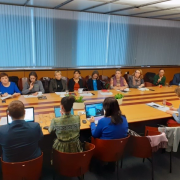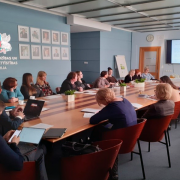Evaluation methodology of land use efficiency and indicator system in land management
The scientific and practical importance of the research conducted by Associate Professor Armands Auziņš on Evaluation Methodology of Land Use Efficiency and Indicator System in Land Management is to continuously monitor the use of land resources and take decisions at different levels of land management in order to promote the rational and sustainable use of these resources for the public benefit. The results of the research are reflected in the scientific monograph.
Management system of real estate development
Associate Professor Sanda Geipele in the research “Management System of Real Estate Development” explores the factors that influence the development of the real estate market and, by assessing the structure and the condition of the residential sector, the intensity of real estate transactions in the segment of the residential construction market, explains the factors affecting the depreciation of the residential sector and the stagnant nature of the real estate market. The analysis of the research, its main results and the formulated conclusions substantiate the necessity of the informative and analytical management system of real estate market development and the continuation of research on the development of real estate market in several directions. The elaborated informative and analytical management system of real estate market development can ensure the regulation of the real estate market both from a legal point of view and current perspective, revealing topical and actual problems. It would also maintain effective communication and cooperation between state/municipal institutions and entrepreneurs/third parties in promoting real estate transactions and their development projects. The results of the research are reflected in the scientific monograph.
MICROPOL – smart work centres in non-metropolitan areas, 1097R4
The overall aim of the project is to improve the measures and instruments of local and regional development policy in order to stimulate growth and employment in non-metropolitan areas. The specific aim of the project is to broaden knowledge of local and regional government and improve strategies for creating smart work centres.
Within the framework of the project, the best practices have been collected, a business model for the operation of the smart work centre has been developed, guidelines for the improvement of regional policy have been formulated, as well as several reports on remote work and smart work centres have been drawn up. The project has been implemented in close cooperation with industry experts and local authorities. As a result of the project, the collaboration centre “School 6” has been established in Cēsis.
Sustainable development of multi-apartment buildings in riga micro-districts
The goal of the project “The Assessment of Climate Impact, Adaptation to Climate Changes and the Social and Economic Values of Adaptation Possibilities for Multi-Apartment Building Districts in Riga and Latvia” (Sustainable Development of Multi-Apartment Buildings in Riga Micro-Districts) is to study the technical condition of typical housing development in Riga, summarise the thermal energy consumption data and describe the need for typical building renovation. The results of the research are intended to formulate the economic substantiation for typical building renovation and energy efficiency measures, determine the conditions for the repayment of financial investments from thermal energy savings and develop a new approach for the involvement of apartment owners in typical building renovation.

CONTACT INFORMATION
6 Kalnciema Str. - 210,
Riga, LV1048, Latvia,
6708 9845
buni (at) rtu.lv









